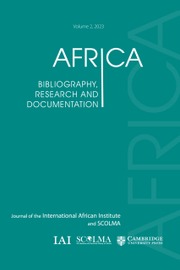Africa Bibliography, Research and Documentation (ABRD) is born of a formal marriage between two publications which have a history of co-habitation in the same space.
The past
African Research and Documentation (ARD) was the journal of SCOLMA, the UK Library and Archives Group on Africa, founded in 1962 ‘to facilitate the acquisition and preservation of library materials needed for African studies and to assist in the recording and use of such materials’. SCOLMA evolved into a network of librarians and other knowledge professionals, and friendly scholars, both professional and (in the best sense of the word) amateur. It has organized conferences and seminars, published directories and standalone works of references, established links with individuals and networks beyond the UK, in Africa itself, in continental Europe and in North America. In later years it established a website.Footnote 1
And from the beginning, there was the journal, at first Library Materials on Africa, relaunched as ARD: the journal of the African Studies Association of the UK (ASAUK) and SCOLMA, in 1973 after an agreement with the ASAUK for a joint publication. After a friendly separation from ASAUK in 1983, SCOLMA resolved to go it alone and ARD (no. 31) appeared in a new format as SCOLMA’s own journal and so continued to the final issue in 2021. The whole run, including published indexes, has now been digitized and is available on Cambridge Core.Footnote 2
The contents were a rich and varied mix. In addition to articles on library and archival practice, including previously unpublished source documents and images, there are articles on a range of themes in publishing and book development in Africa – from books and reading culture, reading promotion, publishing in African languages, African street literature, book clubs and book donation programmes to memoirs and anecdotage, the scholarly and the quirky.
Editors encouraged submissions from practitioners and students in Africa and from beyond academic and professional circles. A number of special issues picked up on the themes of annual SCOLMA conferences – including ‘The Pictorial Record’, film and the moving image, and sport in Africa. There was also an eclectic mix of book reviews, with a special effort to cover and publicize material coming from beyond the usual suspects of academic publishing. In the earlier years there were news items and listings that are now more appropriately disseminated digitally and by social media.
Africa Bibliography, the authoritative guide to works in African studies, has been published under the auspices of the International African Institute (IAI) annually since 1984.Footnote 3 Each volume has included an extended essay on some aspect of information, archives and publishing in and on Africa. The IAI welcomes this merger with SCOLMA’s journal providing both platforms with a sustainable model for the future and the possibility of using evolving publishing technologies to reflect, explore and critique trends in African research, library, archival and publishing practices.
The present, the future
This first issue contains a fine mixture of articles, from senior scholars and practitioners who have published with ARD in the past to young professionals just embarking on their careers. A number are drawn from SCOLMA’s last annual conference, ‘Publishing, Collecting and Accessing African-language Materials’, held online in June 2021. There is a particularly strong focus on African languages and publishing, longstanding interests of the IAI. SCOLMA plans for annual conferences are ongoing and we hope these will be a rich source of articles in years to come.
ABRD will continue and adapt the traditions and standards of its predecessors, extending their digital reach and appealing to new readers and contributors. It will publish articles and book reviews on topics relating to research, libraries, archives and publishing in and on Africa, and in African studies. The editors and publishers launch this first issue in the hope that it will recall and perpetuate the best features of both parents.
Terry A. Barringer is the Editor of Africa Bibliography, Research and Documentation. She served as the compiler of Africa Bibliography 1998–2015 and as the Editor of African Research and Documentation, 2004–21.




